
- •Contents
- •Thanks
- •To the student
- •To the teacher
- •3 Present continuous and present simple 1 (I am doing and I do)
- •10 Present perfect continuous and simple (I have been doing and I have done)
- •11 how long have you (been) … ?
- •12 for and since when … ? and how long … ?
- •13 Present perfect and past 1 (I have done and I did)
- •14 Present perfect and past 2 (I have done and I did)
- •15 Past perfect (I had done)
- •16 Past perfect continuous (I had been doing)
- •17 have and have got
- •18 used to (do)
- •19 Present tenses (I am doing / I do) for the future
- •20 I’m going to (do)
- •21 will and shall 1
- •22 will and shall 2
- •23 I will and I’m going to
- •24 will be doing and will have done
- •26 can, could and (be) able to
- •27 could (do) and could have (done)
- •28 must and can’t
- •29 may and might 1
- •30 may and might 2
- •31 have to and must
- •32 must mustn’t needn’t
- •33 should 1
- •34 should 2
- •35 I’d better … it’s time …
- •36 would
- •39 if I knew … I wish I knew …
- •40 if I had known … I wish I had known …
- •41 wish
- •42 Passive 1 (is done / was done)
- •43 Passive 2 (be done / been done / being done)
- •44 Passive 3
- •45 it is said that … he is said to … he is supposed to …
- •46 have something done
- •47 Reported speech 1 (he said that …)
- •48 Reported speech 2
- •49 Questions 1
- •52 Question tags (do you? isn’t it? etc.)
- •53 Verb + -ing (enjoy doing / stop doing etc.)
- •54 Verb + to … (decide to … / forget to … etc.)
- •55 Verb (+ object) + to … (I want you to …)
- •56 Verb + -ing or to … 1 (remember, regret etc.)
- •57 Verb + -ing or to … 2 (try, need, help)
- •58 Verb + -ing or to … 3 (like / would like etc.)
- •59 prefer and would rather
- •60 Preposition (in/for/about etc.) + -ing
- •61 be/get used to … (I’m used to …)
- •63 there’s no point in -ing, it’s worth -ing etc.
- •64 to … , for … and so that …
- •65 Adjective + to …
- •66 to … (afraid to do) and preposition + -ing (afraid of -ing)
- •67 see somebody do and see somebody doing
- •68 -ing clauses (He hurt his knee playing football.)
- •69 Countable and uncountable 1
- •70 Countable and uncountable 2
- •71 Countable nouns with a/an and some
- •74 the 2 (school / the school etc.)
- •75 the 3 (children / the children)
- •77 Names with and without the 1
- •78 Names with and without the 2
- •79 Singular and plural
- •80 Noun + noun (a bus driver / a headache)
- •81 -’s (your sister’s name) and of … (the name of the book)
- •82 myself/yourself/themselves etc.
- •83 a friend of mine my own house on my own / by myself
- •84 there … and it …
- •85 some and any
- •87 much, many, little, few, a lot, plenty
- •90 all every whole
- •91 each and every
- •92 Relative clauses 1: clauses with who/that/which
- •94 Relative clauses 3: whose/whom/where
- •95 Relative clauses 4: extra information clauses (1)
- •96 Relative clauses 5: extra information clauses (2)
- •97 -ing and -ed clauses (the woman talking to Tom, the boy injured in the accident)
- •98 Adjectives ending in -ing and -ed (boring/bored etc.)
- •99 Adjectives: a nice new house, you look tired
- •100 Adjectives and adverbs 1 (quick/quickly)
- •102 so and such
- •104 quite, pretty, rather and fairly
- •105 Comparative 1 (cheaper, more expensive etc.)
- •106 Comparative 2 (much better / any better etc.)
- •107 Comparative 3 (as … as / than)
- •108 Superlative (the longest / the most enjoyable etc.)
- •109 Word order 1: verb + object; place and time
- •110 Word order 2: adverbs with the verb
- •111 still any more yet already
- •112 even
- •114 in case
- •116 as (as I walked … / as I was … etc.)
- •117 like and as
- •119 during for while
- •121 at/on/in (time)
- •122 on time and in time at the end and in the end
- •123 in/at/on (position) 1
- •124 in/at/on (position) 2
- •125 in/at/on (position) 3
- •126 to, at, in and into
- •127 in/on/at (other uses)
- •129 Noun + preposition (reason for, cause of etc.)
- •130 Adjective + preposition 1
- •131 Adjective + preposition 2
- •132 Verb + preposition 1 to and at
- •134 Verb + preposition 3 about and of
- •135 Verb + preposition 4 of/for/from/on
- •136 Verb + preposition 5 in/into/with/to/on
- •137 Phrasal verbs 1 Introduction
- •138 Phrasal verbs 2 in/out
- •139 Phrasal verbs 3 out
- •142 Phrasal verbs 6 up/down
- •143 Phrasal verbs 7 up (1)
- •144 Phrasal verbs 8 up (2)
- •145 Phrasal verbs 9 away/back
- •Additional exercises
- •Study guide
- •Key to Exercises
- •Key to Additional exercises (see page 302)
- •Key to Study guide
- •Index
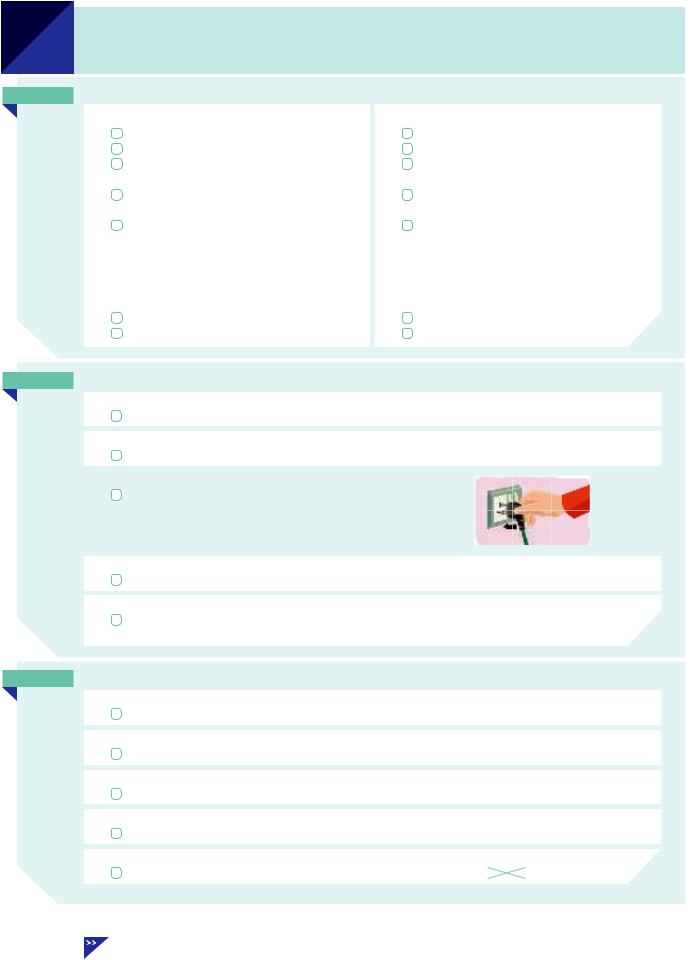
Unit
138 Phrasal verbs 2 in/out
ACompare in and out:
in = into a room, a building, a car etc.
How did the thieves get in?
Here’s a key, so you can let yourself in.
Lisa walked up to the edge of the pool and dived in. (= into the water)
I’ve got a new apartment. I’m moving in on Friday.
As soon as I got to the airport, I checked in.
In the same way you can say go in, come in, walk in, break in etc.
Compare in and into:
I’m moving in on Friday.
I’m moving into my new flat on Friday
out = out of a room, a building, a car etc.
Stay in the car. Don’t get out.
I had no key, so I was locked out.
She swam up and down the pool, and then climbed out.
Andy opened the window and looked out.
We paid the hotel bill and checked out.
In the same way you can say go out,
get out, move out, let somebody out etc.
Compare out and out of:
She climbed out.
She climbed out of the pool.
BOther verbs + in
drop in = visit somebody at home without arranging to do this
I dropped in to see Chris on my way home.
join in = take part in something that is already going on
They were playing cards, so I joined in.
plug in an electrical machine = connect it to the electricity supply |
PLUG IN |
The fridge isn’t working because you haven’t plugged it in. |
|
|
|
take somebody in = deceive somebody
The man said he was a policeman and I believed him. I was completely taken in.
fill in or fill out a form, a questionnaire etc. = write the necessary information on a form
Please fill in the application form and send it to us by 28 February. or Please fill out the application form …
COther verbs + out
eat out = eat at a restaurant, not at home
There wasn’t anything to eat at home, so we decided to eat out.
drop out of college / university / a course / a race = stop before you have completely finished
Gary went to university but dropped out ater a year.
get out of something that you arranged to do = avoid doing it
I promised I’d go to the wedding. I don’t want to go, but I can’t get out of it now.
leave something out = omit it, not include it
In the sentence ‘She said that she was ill’, you can leave out
cross something out = write a line through something
Some of the names on the list had been crossed out.
the word ‘that’.
Sarah |
CROSS OUT |
276 |
Phrasal verbs 1 (Introduction) Unit 137 More verbs + out Unit 139 |

Exercises |
|
|
|
|
Unit |
||
|
|
|
|
138 |
|||
|
|
|
|
|
|
|
|
|
|
|
|
|
|
||
138.1 |
Complete the sentences. |
|
|
|
|
|
|
1 |
Here’s a key so that you can |
let yourself in. |
|
|
|
||
2 |
Lisa doesn’t like cooking, so she |
|
out a lot. |
|
|
||
3 |
If you’re in our part of town, you should |
in and say hello. |
|||||
4 |
Could you |
in this questionnaire? It will only take five minutes. |
|||||
5 |
Amy isn’t living in this house any more. She |
|
out a few weeks ago. |
||||
6 |
Ater breakfast, we |
|
out of the hotel and got a taxi to the airport. |
||||
7 |
I wanted to charge my phone, but there was nowhere to |
the charger in. |
|||||
8 |
Paul started doing a Spanish course, but he |
|
out ater a few weeks. |
||||
9 |
Be careful! The water isn’t very deep here, so don’t |
in. |
|||||
|
|
|
|||||
138.2 |
Complete the sentences with in, into, out or out of. |
|
|
||||
1 |
I’ve got a new flat. I’m moving in |
on Friday. |
|
|
|
||
2 |
We arrived at the hotel and checked |
|
. |
|
|
||
3 |
When are you moving |
|
your new flat? |
|
|
||
4 |
The car stopped and the driver got |
|
. |
|
|
||
5 |
Thieves broke |
the house and stole some jewellery. |
|||||
6 |
How did the thieves break |
|
? Through a window? |
||||
7 |
He opened his wallet and something fell |
. |
|
|
|||
8 |
Kate was angry and walked |
|
the meeting. |
|
|
||
|
|
|
|||||
138.3 |
Complete the sentences using a verb + in or out (of). |
|
|
||||
1 |
Lisa walked to the edge of the pool, |
dived in |
and swam to the other end. |
||||
2 |
Not all the runners finished the race. Three of them |
. |
|
||||
3 |
I went to see Joe and Sophie in their new house. They |
last week. |
|||||
4 |
I’ve told you everything you need to know. I don’t think I’ve |
anything. |
|||||
5 |
Some people in the crowd started singing. Then a few more people |
||||||
|
|
and soon everybody was singing. |
|
|
|
|
|
6 |
Don’t be |
|
by him. If I were you, I wouldn’t believe anything he says. |
||||
7 |
I |
to see Laura a few days ago. She was fine. |
|||||
138.4 Complete the sentences. Use the word in brackets in the correct form.
1 |
a: The fridge isn’t working. |
|
|
|
|
B: That’s because you haven’t |
plugged it in |
. (plug) |
|
2 |
a: What do I have to do with these forms? |
|
|
|
|
B: |
and send them to this address. (fill) |
|
|
3 |
a: I’ve made a mistake on this form. |
|
|
|
|
B: That’s OK. Just |
|
and correct it. (cross) |
|
4 |
a: Have you been to the new club I told you about? |
|
||
|
B: No. We went there, but they wouldn’t |
|
because we weren’t |
|
|
members. (let) |
|
|
|
5 |
a: Can we meet tomorrow at ten? |
|
|
|
|
B: Probably. I have another meeting, but I think I can |
. (get) |
||
138.5 Complete the second sentence so that it means the same as the first. Use a verb from Sections B or C.
1 |
Let’s go to a restaurant tonight. |
Let’s eat out |
tonight. |
2 |
Why didn’t you finish college? |
Why did you |
? |
3 |
Please complete the application form. |
Please |
form . |
4 |
I can’t avoid going to the party. |
I can’t |
to the party. |
5 |
I thought the email was genuine, but it wasn’t. |
I was completely |
the email . |
6 |
You must come and see us sometime. |
You must |
sometime. |
7 |
Steve was upset because he wasn’t chosen |
Steve was upset because he |
|
|
for the team. |
the team. |
|
Additional exercises 37–41 (pages 323–25) |
277 |
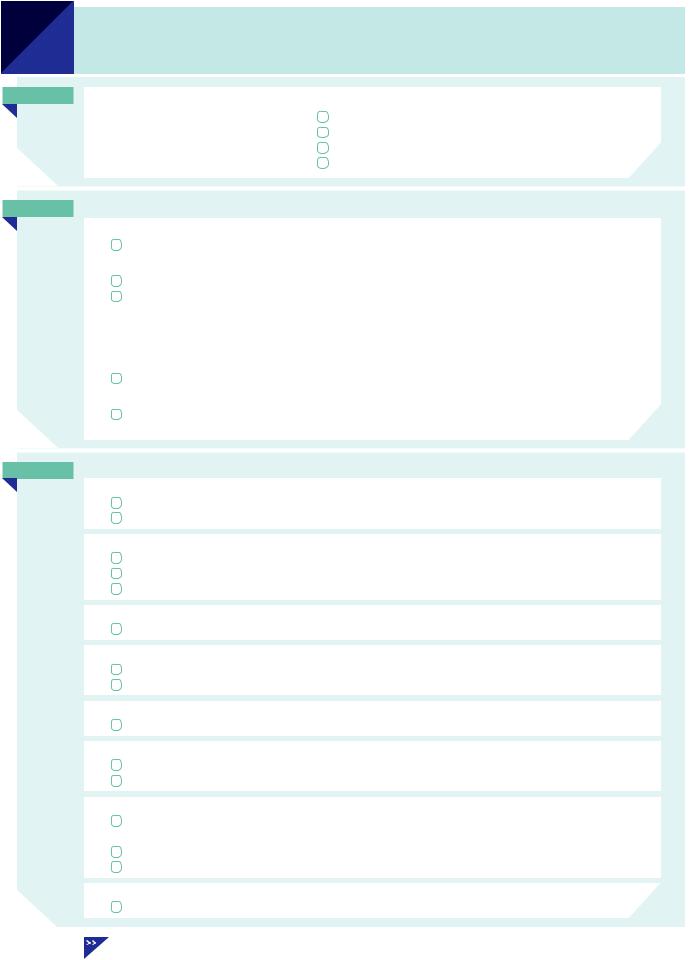
Unit
139 Phrasal verbs 3 out
Aout = not burning, not shining
go out
put out a fire / a cigarette / a light turn out a light
blow out a candle
Suddenly all the lights in the building went out. I put the fire out with a fire extinguisher.
I turned the lights out before leaving.
We don’t need the candle. You can blow it out.
Bwork out
work out = do physical exercises
Rachel works out at the gym three times a week.
work out = develop, progress
Good luck for the future. I hope everything works out well for you.
a: Why did James leave the company?
B: Things didn’t work out. (= things didn’t work out well)
work out (for calculations):
 The total bill for three people is £97.35. That works out at £32.45 each. work (something) out = calculate
The total bill for three people is £97.35. That works out at £32.45 each. work (something) out = calculate
345 × 76? I need a calculator. I can’t work it out in my head.
work out or figure out = understand, think about a problem and find an answer
Investigators are trying to work out what caused the accident. or Investigators are trying to figure out what caused the accident.
COther verbs + out
carry out an order / an experiment / a survey / an investigation / a plan etc.
Soldiers are expected to carry out orders.
An investigation into the accident will be carried out.
find out that/what/when (etc.) … , find out about … = get information about
The police never found out who committed the crime.
I just found out that it’s Helen’s birthday today.
I checked a few websites to find out about hotels in the town.
give/hand things out = give to each person
At the end of the lecture, the speaker gave out information sheets to the audience.
point something out (to somebody) = draw attention to it
As we drove through the city, the tour guide pointed out all the sights. I didn’t realise I’d made a mistake until somebody pointed it out to me.
run out (of something)
We ran out of petrol on the motorway. (= we used all our petrol)
sort something out = find a solution to, put in order
There are a few problems we need to sort out.
All these papers are mixed up. I’ll have to sort them out.
turn out to be … / turn out good/nice etc. / turn out that …
Nobody believed Paul at first, but he turned out to be right. (= it became clear in the end that he was right)
The weather wasn’t so good in the morning, but it turned out nice later. I thought they knew each other, but it turned out that they’d never met.
try out a machine, a system, a new idea etc. = test it to see if it is OK The company is trying out some new sotware at the moment.
278 |
Phrasal verbs 1 (Introduction) Unit 137 More verbs + out Unit 138 |
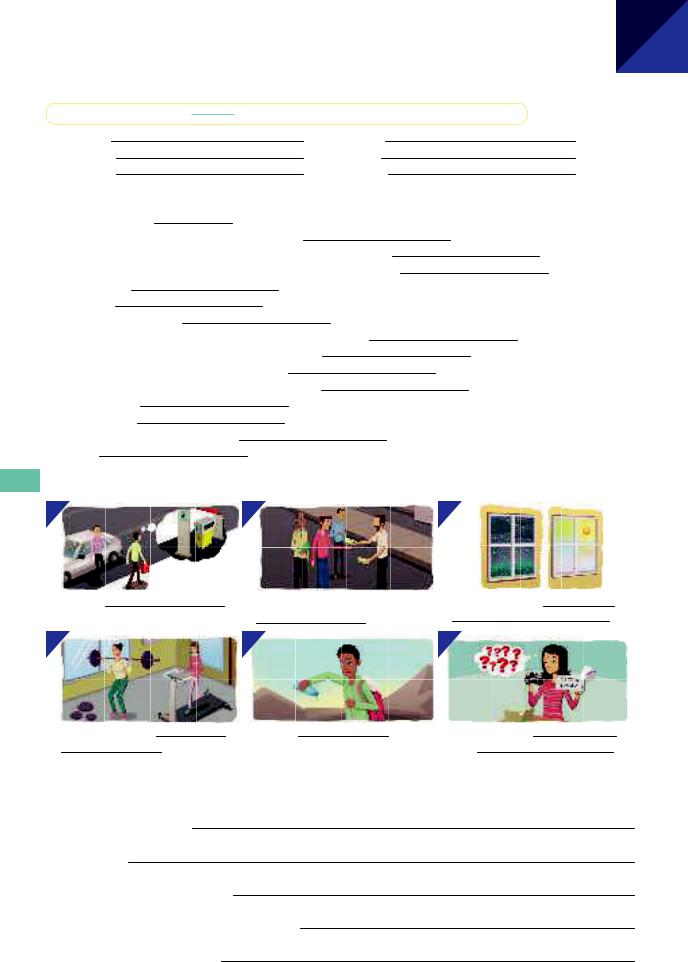
Exercises
139.1 |
Which words can go together? Choose from the list. |
|
|
||||||
|
|
a candle |
a fire |
|
a light |
a new product |
an order |
a problem |
|
1 |
turn out a |
light |
|
|
4 |
put out |
|
||
2 |
blow out |
|
|
|
5 |
try out |
|
|
|
3 |
carry out |
|
|
|
6 |
sort out |
|
||
|
|
|
|
||||||
139.2 |
Complete the sentences using a verb + out. |
|
|
|
|||||
1 |
The company is |
trying out |
a new computer system at the moment. |
||||||
2 |
Steve is very fit. He does a lot of sport and |
|
|
regularly. |
|||||
3 |
The road will be closed for two days while building work is |
. |
|||||||
4 |
We didn’t manage to discuss everything at the meeting. We |
of time. |
|||||||
5 |
You have to |
|
|
|
the problem yourself. I can’t do it for you. |
||||
6 |
I need to |
|
|
|
what happened exactly. It’s not clear at the moment. |
||||
7 |
The new drug will be |
|
on a small group of patients. |
||||||
8 |
I thought the two books were the same until someone |
|
the dif erence. |
||||||
9 |
They got married a few years ago, but it didn’t |
|
|
and they separated. |
|||||
10 |
There was a power cut and all the lights |
|
|
. |
|||||
11 |
We thought she was American at first, but she |
|
|
to be Swedish. |
|||||
12 |
Sometimes it |
|
|
cheaper to eat in a restaurant than to cook at home. |
|||||
13 |
How did you |
|
|
|
about the project? Did somebody tell you? |
||||
14 |
It took firefighters two hours to |
|
|
the fire. |
|
||||
15 |
I can’t |
|
|
|
how the water is getting into the house. |
||||
139.3 For each picture, complete the sentence using a verb + out.
Unit
139
|
1 |
|
2 |
|
3 |
|
|
|
|
|
|
|
|
|
earlier |
now |
|
|
|
|
|
|
|
|
|
|
|
|
|
They’ve run out of petrol . |
The man with the beard is |
The weather has |
|
|
|
|
|
|
|
|
leaflets. |
|
. |
|
|
|
|
|
|
|
|
|
|
|
|
4 |
|
5 |
|
6 |
|
|
|
|
|
KIM |
|
|
|
LISA |
|
|
|
|
SALLY |
|
|
|
|
|
|
|
|
Sally and Kim are |
Joe has |
water. |
Lisa is trying to |
|
|
|
|
|
at the gym. |
|
|
how |
. |
|
|
|
|
|
|
|
|
||
|
|
Complete the sentences. Each time use a verb + out. |
|
|
|
|
||
139.4 |
|
|
|
|
|
|||
1 |
a: Was the fire serious? |
|
|
|
|
|
||
|
|
|
B: No, we were able to put it |
out |
|
|
. |
|
2 |
a: This recipe looks interesting. |
|
|
|
|
|
||
|
|
|
B: Yes, let’s |
|
|
|
. |
|
3 |
a: How much money do I owe you exactly? |
|
|
|
|
|||
|
|
|
B: Just a moment. I’ll have to |
|
|
|
. |
|
4 |
a: What happened about your problem with your bank? |
|
|
|
||||
|
|
|
B: It’s OK now. I went to see them and we |
|
|
. |
||
5 |
a: You’ve written the wrong date on this form. |
|
|
|
|
|||
|
|
|
B: Oh, so I have. Thanks for |
|
|
|
. |
|
Additional exercises 37–41 (pages 323–25) |
279 |
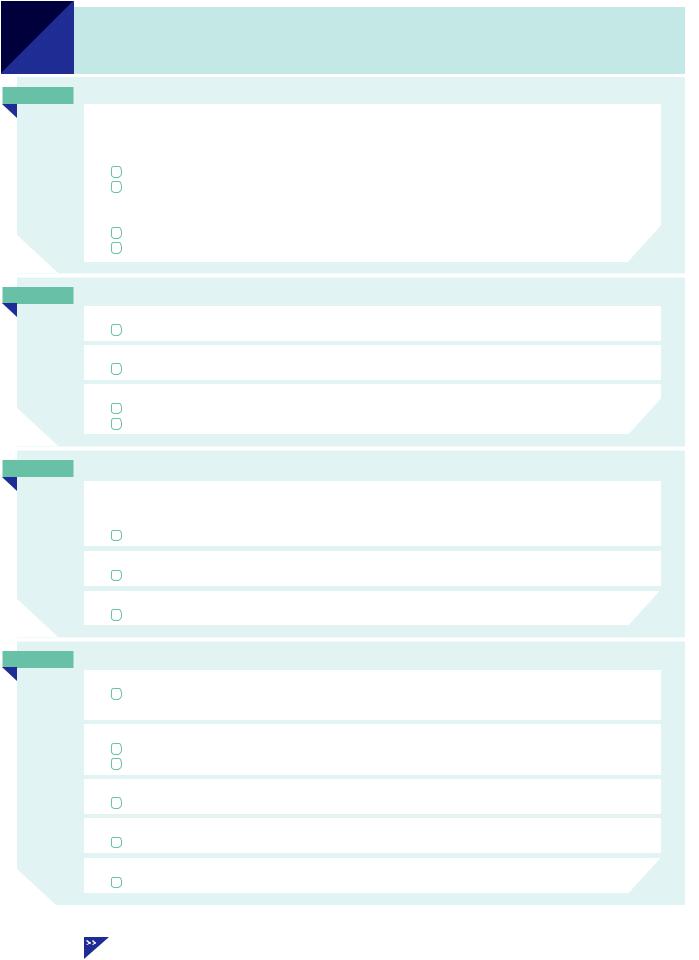
Unit
140 Phrasal verbs 4 on/of (1)
Aon and of for lights, machines etc.
We say:
the light is on / put the light on / leave the light on etc.
turn the light on/of or |
switch the light on/of |
Shall I leave the lights on or turn them of? |
|
‘Is the heating on?’ |
‘No, I switched it of.’ |
also |
|
put (music, a song) on, put the kettle on:
Let’s put some music on. What would you like to hear? We need boiling water, so I’ll put the kettle on.
Bon and of for events etc.
go on = happen
What’s all that noise? What’s going on? (= what’s happening)
call something of = cancel it
The concert in the park had to be called of because of the weather.
put something of, put of doing something = delay it
The election has been put of until January.
We can’t put of making a decision. We have to decide now.
Con and of for clothes etc.
put on clothes, glasses, make-up, a seat belt etc.
 My hands were cold, so I put my gloves on. put on weight = get heavier
My hands were cold, so I put my gloves on. put on weight = get heavier
I’ve put on two kilos in the last month.
try on clothes (to see if they fit)
I tried on a jacket in the shop, but it didn’t look right.
take of clothes, glasses etc.
It was warm, so I took of my coat.
Dof = away from a person or place
be of (to a place)
Tomorrow I’m of to Paris. / I’m of on holiday. (= I’m going to Paris / I’m going on holiday)
walk of / run of / drive of / ride of / go of (similar to walk away / run away etc.)
Anna got on her bike and rode of.
Mark let home at the age of eighteen and went of to Canada.
set of = start a journey
We set of early to avoid the trafic. (= We let early)
take of = leave the ground (for planes)
Ater a long delay, the plane finally took of.
see somebody of = go with them to the airport/station to say goodbye
Helen was going away. We went to the station with her to see her of.
280 |
Phrasal verbs 1 (Introduction) Unit 137 More verbs + on/of Unit 141 |
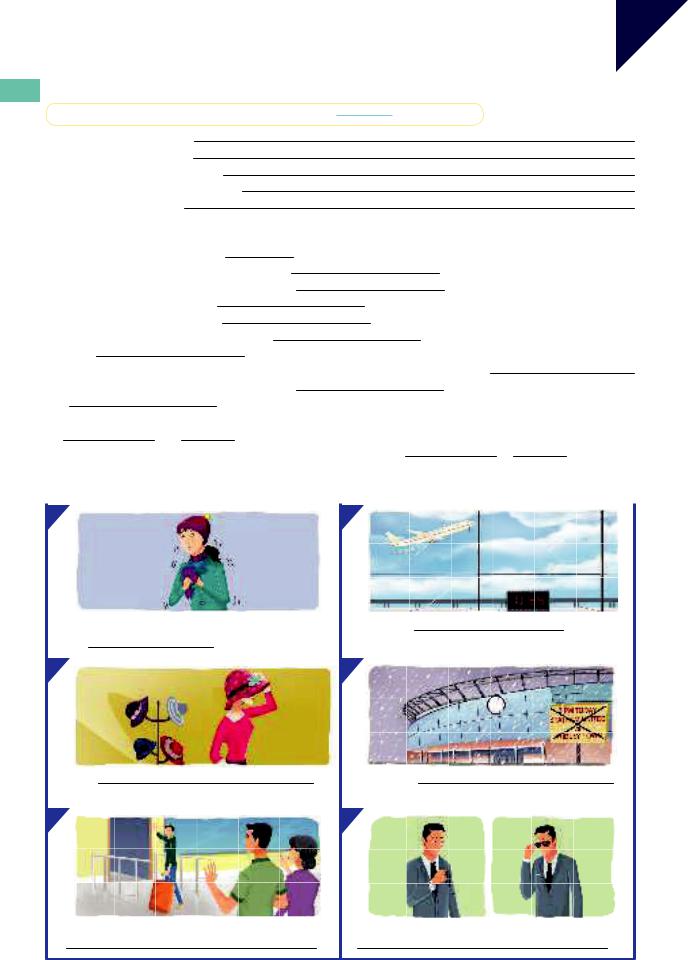
Exercises |
Unit |
140 |
|
|
|
140.1 Complete the sentences using put on + the following:
|
|
some music |
the heating |
the kettle |
the light |
the oven |
|
|
||
1 |
It was getting dark, so I put |
the light |
on |
|
|
. |
||||
2 |
It was getting cold, so I |
|
|
|
|
. |
||||
3 |
I wanted to bake a cake, so I |
|
|
|
|
. |
||||
4 |
I wanted to make some tea, so I |
|
|
|
. |
|||||
5 |
I wanted to relax, so I |
|
|
|
|
. |
||||
|
Complete the sentences. Use a verb + on or of. |
|
|
|
|
|||||
140.2 |
|
|
|
|
|
|||||
1 |
It was hot in the cinema, so I |
took off |
my jacket. |
|
|
|
||||
2 |
What are all these people doing? What’s |
|
|
? |
|
|
||||
3 |
The weather was too bad for the plane to |
|
, so the flight was delayed. |
|||||||
4 |
Rachel got into her car and |
|
|
at high speed. |
|
|
||||
5 |
Tim is too thin. He needs to |
|
|
weight. |
|
|
|
|||
6 |
We spent the whole day walking. We |
|
|
at 8 am and walked for ten hours. |
||||||
7 |
Don’t |
|
until tomorrow what you can do today. |
|
|
|||||
8 |
They’ve changed their minds about getting married. The wedding has been |
. |
||||||||
9 |
Are you cold? Shall I get you a sweater to |
|
? |
|
|
|||||
10 |
I |
|
some jeans in the shop, but they were too tight. |
|
|
|||||
11 |
When I go away, I prefer to be alone at the station or airport. I don’t like it when people come to |
|||||||||
|
|
|
|
me |
. |
|
|
|
|
|
12 |
I need to make an appointment to see the dentist, but I keep |
it |
. |
|
||||||
|
Look at the pictures and complete the sentences. |
|
|
|
||||||
140.3 |
|
|
|
|
||||||
|
|
|
|
|
|
|
|
|
|
|
1 |
|
|
|
|
2 |
|
|
|
||
Her hands were cold, so |
The plane |
at 10.55. |
she put her gloves on . |
|
|
|
|
|
3 |
4 |
|
Maria |
, |
The match |
but it was too big for her. |
|
because of the weather. |
|
|
|
5 |
|
6 |
Mark’s parents went to the airport to |
He took his sunglasses out of his pocket and |
. |
. |
Additional exercises 37–41 (pages 323–25) |
281 |
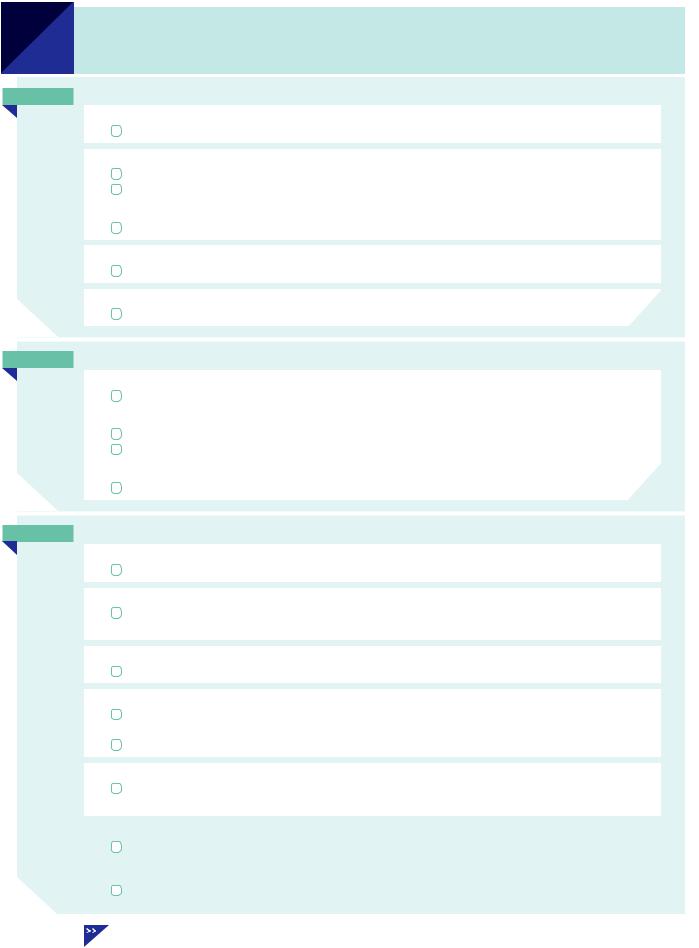
Unit
141 Phrasal verbs 5 on/o (2)
Averb + on = continue doing something
go on = continue
The party went on until 4 o’clock in the morning.
go on / carry on doing something = continue doing it
We can’t go on spending money like this. We’ll have nothing let soon. I don’t want to carry on working here. I’m going to look for another job.
go on with / carry on with something = continue it
Don’t let me disturb you. Please carry on with what you’re doing.
keep on doing (or keep doing) something = do it continuously or repeatedly
He keeps on criticising me. It’s not fair! (or He keeps criticising me.)
drive on / walk on / play on = continue driving/walking/playing etc.
Shall we stop at this petrol station or shall we drive on to the next one?
Bget on
get on = progress
How are you getting on in your new job? (= How is it going?)
get on (with somebody) = have a good relationship
Joanne and Karen don’t get on. They’re always arguing.
Richard gets on well with his neighbours. They’re all very friendly.
get on with something = continue something you have to do, usually ater an interruption
I must get on with my work. I have a lot to do.
Cverb + of
doze of / drop of / nod of = fall asleep
I dozed of during the lecture. It was very boring.
finish something of = do the last part of it
a: Have you finished painting the kitchen? b: Nearly. I’ll finish it of tomorrow.
go of = make an alarm sound
Did you hear the alarm go of?
put somebody of (doing) something so that they don’t want it or want to do it any more
We wanted to go to the exhibition, but we were put of by the long queue. (= we didn’t go because of the long queue)
What put you of applying for the job? Was the salary too low?
rip somebody of / be ripped of = cheat somebody / be cheated
Did you really pay £2,000 for that painting? I think you were ripped of. (= you paid too much)
|
show of = try to impress people with your ability, your knowledge etc. |
|
|
Look at that boy on the bike riding with no hands. He’s just showing of. |
|
|
|
|
|
|
|
|
tell somebody of = speak angrily to somebody because they did something wrong |
|
|
Clare’s mother told her of for wearing dirty shoes in the house. |
|
|
|
|
|
|
|
|
go on / carry on / keep on Unit 53B Phrasal verbs 1 (Introduction) Unit 137 |
|
282 |
More verbs + on/of Unit 140 American English → Appendix 7 |
|

Exercises
141.1 |
What do these sentences mean? |
|
|
|
|||
1 |
I carried on studying. |
|
|
|
|
||
2 |
a |
I started studying. |
b I continued studying. |
c |
I put of studying. |
(b is correct) |
|
I nodded of. |
|
|
|
|
|||
|
|
a I agreed. b I felt sick. c I fell asleep. |
|
|
|
||
3 |
We were ripped of. |
|
|
|
|
||
|
|
a We were attacked. |
b We paid too much. c Our clothes were torn. |
||||
4 |
I told them of. |
|
|
|
|
||
|
|
a I criticised them. |
b I was satisfied with them. |
c I told them to go away. |
|||
5 |
They don’t get on. |
|
|
|
|
||
|
|
a They don’t like each other much. b They are lazy. c They don’t know each other. |
|||||
6He was showing of.
a He was joking. b He was trying to impress us. c He wasn’t telling the truth.
141.2Complete each sentence using a verb + on or o .
1 |
We can’t go on spending money like this. We’ll have nothing let soon. |
||
2 |
I’m not ready to go home yet. I have a few things to |
. |
|
3 |
‘Shall I stop the car here?’ |
‘No, |
a bit further.’ |
4 |
Dan paid too much for the car he bought. I think he was |
. |
|
5 |
Emma is enjoying her course at university. She’s |
very well. |
|
6 |
The fire alarm |
and everybody had to leave the building. |
|
7 |
Ben was |
by his boss for being late for work repeatedly. |
|
8 |
The meeting has only just finished. It |
longer than expected. |
|
9 |
I really like working with my colleagues. We all |
really well together. |
|
10 |
I |
making the same mistake. It’s very frustrating. |
|
11 |
I’ve just had a cofee break, and now I must |
with my work. |
|
12 |
Peter likes people to know how clever he is. He’s always |
. |
|
13 |
We decided not to go to the concert. We were |
by the cost of tickets. |
|
14 |
Jack paused for a moment and then |
with his story. |
|
15 |
I was so tired at work today. I nearly |
at my desk a couple of times. |
|
141.3Complete the sentences. Use a verb (in the correct form) + on or o . Sometimes you will need other words as well. Choose from:
|
carry |
finish |
get |
get |
go |
keep |
rip |
tell |
1 |
a: How |
are you getting on in your new job? |
|
|
||||
|
b: Fine, thanks. It’s going very well. |
|
|
|
|
|||
2 |
a: What’s Tanya like? |
|
|
|
|
|
||
|
b: She’s very nice and easy-going. She |
|
|
everybody. |
||||
3 |
a: Is Gary going to retire soon? |
|
|
|
|
|||
|
b: No, he likes his job and wants to |
|
|
|
working. |
|||
4 |
a: Have you written the letter you had to write? |
|
|
|||||
|
b: I’ve started it. I’ll |
|
|
|
|
tomorrow. |
||
5 |
a: We took a taxi to the airport. It cost £40. |
|
|
|
||||
|
b: £40! Normally it costs about £20. You |
|
|
. |
||||
6 |
a: Why were you late for work this morning? |
|
|
|
||||
|
b: I overslept. My alarm clock didn’t |
|
|
|
. |
|||
7 |
a: Some children at the next table in the restaurant were behaving very badly. |
|||||||
|
b: Why didn’t their parents |
|
|
|
|
? |
||
8 |
a: Is Kate good at making decisions? |
|
|
|
|
|||
|
b: No, she isn’t. |
|
|
|
|
changing her mind. |
||
Unit
141
Additional exercises 37–41 (pages 323–25) |
283 |
